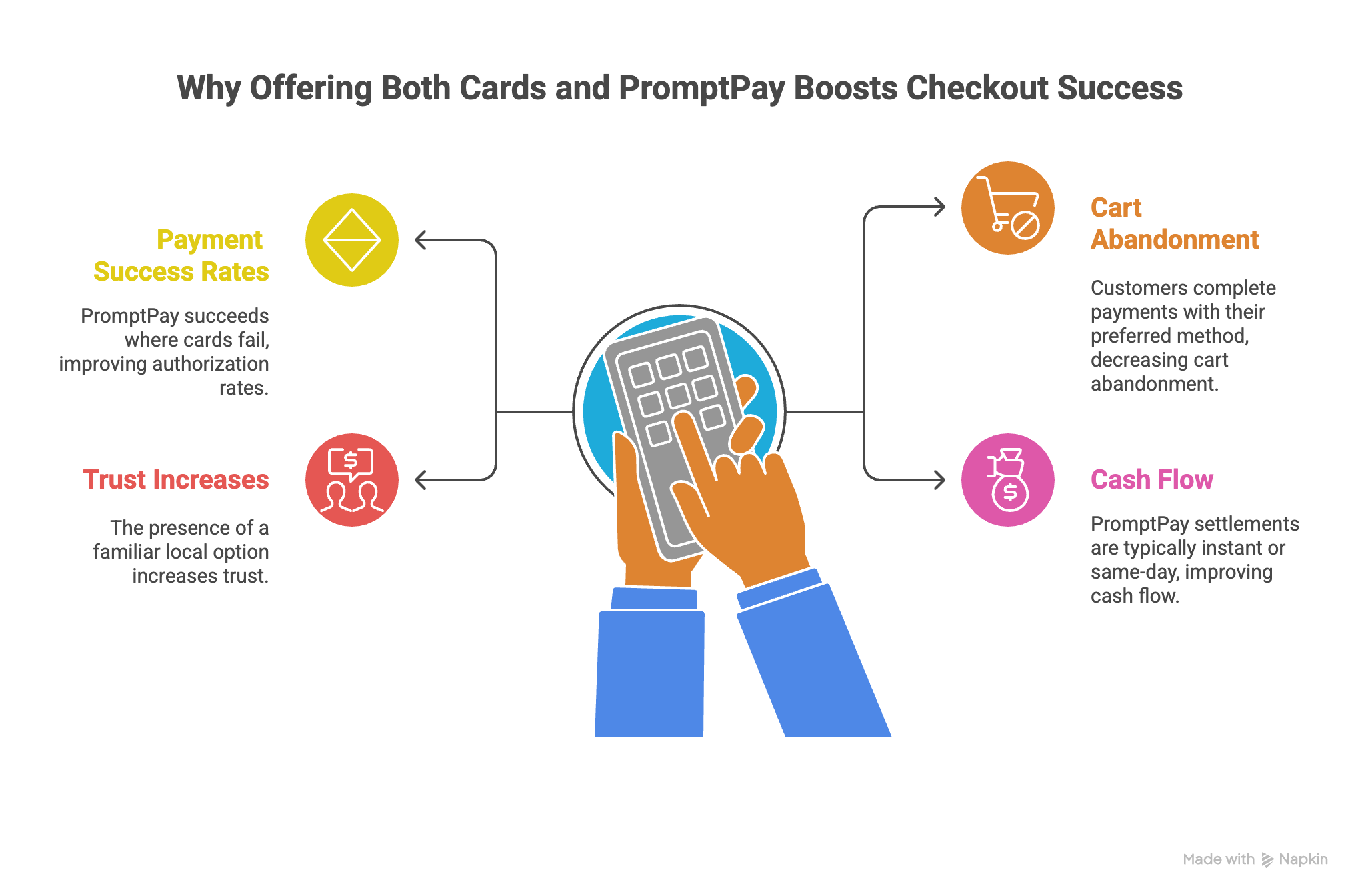
Thailand is one of Southeast Asia’s fastest-growing digital economies. With a population that is increasingly mobile-first, digital payments are now part of everyday life. For international businesses selling to Thai customers, however, the biggest challenge remains checkout success.
Credit and debit cards remain important, but they often fall short. Many transactions are declined, card coverage is limited outside urban centers, and foreign exchange costs can discourage buyers. This results in abandoned checkouts and lost revenue opportunities.
PromptPay, Thailand’s national QR-based payment method overseen by the Bank of Thailand and National ITMX, has become the mainstream alternative. With more than 81 million registrations and billions of transactions every month, it is trusted by consumers across all sectors.
For global B2B and e-commerce businesses, enabling PromptPay alongside cards means fewer failed payments, higher authorization rates, and greater customer trust.
With Tazapay, you can offer PromptPay through a unified checkout that also supports cards and 80+ other local payment methods, going live within days.
PromptPay adoption has grown dramatically, making it an indispensable part of Thailand’s payment ecosystem:
This progression shows PromptPay’s journey from a domestic initiative to a critical tool for international businesses. Offering PromptPay at checkout has become an expectation, not a differentiator, for global merchants operating in Thailand.
.png)
E-commerce platforms and online marketplaces often see high cart abandonment in Thailand due to card failures or customer hesitation.
By offering PromptPay alongside cards:
PromptPay has become a default option for Thai shoppers, so businesses that include it maximize completed orders and revenue.
Thailand’s travel industry is huge, and online booking platforms often face failed transactions at checkout. This is particularly challenging for mid-range purchases like hotel reservations or tour bookings.
PromptPay helps by:
For online travel agencies and hotel platforms, PromptPay improves booking completion and reduces drop-offs.
Thailand has one of Asia’s most engaged digital populations, with significant spending on gaming and online products. But micro-transactions and one-off purchases often fail on card-only checkouts.
PromptPay ensures:
This makes PromptPay especially valuable for digital platforms, app stores, and gaming companies serving Thai customers.
As online education grows in Thailand, payment access remains a barrier. Many students and professionals lack international-ready cards, making it difficult to enroll in global courses.
PromptPay solves this by:

Businesses that provide multiple payment options serve more customers and reduce payment risk. In Thailand:
PromptPay complements cards rather than replacing them. Together, they capture the widest possible customer base and maximize checkout success.
Merchants relying only on cards or international transfers face:
Adding PromptPay addresses these risks and future-proofs your checkout strategy.
Tazapay simplifies the complexity of enabling PromptPay for cross-border businesses:
Whether you prioritize speed or brand control, Tazapay gives you the flexibility to add PromptPay and optimize checkout for higher authorization rates and faster settlement.
Thailand’s digital economy offers huge opportunities for global businesses, but only if they solve checkout friction. Cards remain necessary, but PromptPay has become an equally important option.
With more than 81 million registrations and over 2 billion monthly transactions in 2025, PromptPay is one of Thailand’s most trusted and widely used payment methods. Businesses that offer it alongside cards increase conversions, reduce abandonment, and build stronger customer trust.
With Tazapay, you can integrate PromptPay quickly and compliantly, enabling a better checkout experience for your Thai customers.
Ready to start? Talk to Tazapay and enable PromptPay today.

In the dynamic realm of cross-border eCommerce, seamless payment experiences are the cornerstone of successful international sales. Despite the growing diversity of global payment preferences, credit cards remain a universal staple.
Yet, international retailers face a unique challenge: optimizing card authorization rates to minimize checkout abandonment and maximize global customer satisfaction. This article delves into strategies for boosting card authorization rates, a crucial element for thriving in the competitive landscape of cross-border eCommerce.
Card authorization rates play a pivotal role in ensuring the smooth completion of cross-border transactions. Defined as the percentage of transactions approved during the authorization phase, these rates are critical for maintaining a frictionless payment experience for customers worldwide.
High authorization rates signify a seamless checkout process, essential for building trust and loyalty among international shoppers.

Low authorization rates can significantly impede cross-border sales, leading to lost revenue and customer dissatisfaction on a global scale. The impact of failed payments is magnified in international eCommerce, where trust and reliability are paramount.
Understanding the hidden costs of these failed transactions, particularly in the context of selling high-value goods across borders, is crucial for any eCommerce platform aiming for international success.
The complexity of cross-border payments introduces unique challenges affecting authorization rates:
Improving card authorization rates for cross-border eCommerce requires understanding and addressing the specific needs of an international clientele:
In the intricate dance of cross-border eCommerce, where each step from browsing to payment transcends borders, the choice of a payment provider becomes pivotal. The right partner, like Tazapay, doesn't just facilitate transactions; it elevates them, ensuring high authorization rates that are crucial for international success. Here's how:
Strategic Global Partnerships: Tazapay's vast network of issuer and network partnerships shines brightest in the realm of cross-border transactions. These strategic alliances ensure that payments are not only secure but also highly likely to be authorized, regardless of geographical and financial boundaries.
Localised Payment Solutions: Understanding and navigating the payment preferences of different regions can be daunting. Tazapay simplifies this, offering localized payment solutions that resonate with customers worldwide, significantly boosting authorization rates for international sales.
Advanced Fraud Detection Tailored for Global Commerce: The balance between preventing fraud and approving legitimate transactions is particularly challenging in cross-border eCommerce. Tazapay employs sophisticated fraud detection mechanisms that are fine-tuned for the global stage, minimizing unnecessary declines while protecting your revenues.
Compliance and Adaptability Across Borders: As global data laws and payment regulations evolve, staying compliant is key to maintaining high authorization rates. Tazapay's proactive approach ensures your payment processes remain on the right side of regulations, adapting swiftly to changes that could impact international transaction success.
By partnering with Tazapay for your cross-border eCommerce needs, you tap into a world where payment processes are not just transactions but strategic tools for global market expansion. Tazapay's emphasis on high authorization rates through strategic issuer and network partnerships offers businesses a clear path to international growth and customer satisfaction.
Optimizing card authorization rates is a vital strategy for enhancing the cross-border eCommerce experience. By addressing the unique challenges of international payments and partnering with a provider like Tazapay, businesses can unlock new levels of success in the global market.